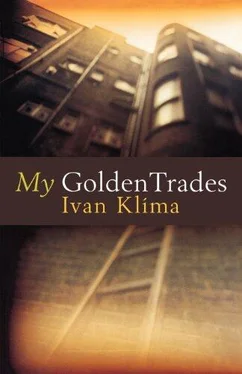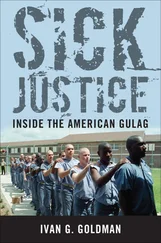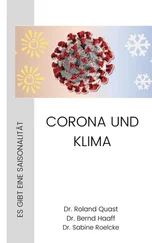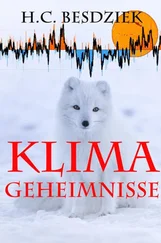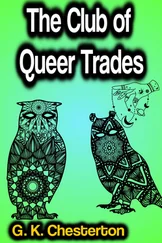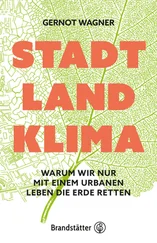Ivan Klima - My Golden Trades
Здесь есть возможность читать онлайн «Ivan Klima - My Golden Trades» весь текст электронной книги совершенно бесплатно (целиком полную версию без сокращений). В некоторых случаях можно слушать аудио, скачать через торрент в формате fb2 и присутствует краткое содержание. Год выпуска: 1998, Издательство: Granta UK, Жанр: Современная проза, на английском языке. Описание произведения, (предисловие) а так же отзывы посетителей доступны на портале библиотеки ЛибКат.
- Название:My Golden Trades
- Автор:
- Издательство:Granta UK
- Жанр:
- Год:1998
- ISBN:нет данных
- Рейтинг книги:4 / 5. Голосов: 1
-
Избранное:Добавить в избранное
- Отзывы:
-
Ваша оценка:
- 80
- 1
- 2
- 3
- 4
- 5
My Golden Trades: краткое содержание, описание и аннотация
Предлагаем к чтению аннотацию, описание, краткое содержание или предисловие (зависит от того, что написал сам автор книги «My Golden Trades»). Если вы не нашли необходимую информацию о книге — напишите в комментариях, мы постараемся отыскать её.
My Golden Trades — читать онлайн бесплатно полную книгу (весь текст) целиком
Ниже представлен текст книги, разбитый по страницам. Система сохранения места последней прочитанной страницы, позволяет с удобством читать онлайн бесплатно книгу «My Golden Trades», без необходимости каждый раз заново искать на чём Вы остановились. Поставьте закладку, и сможете в любой момент перейти на страницу, на которой закончили чтение.
Интервал:
Закладка:
That evening my wife and I put on our best clothes and went to a reception for an American writer at the US embassy. I was invited as a fellow writer, not as a surveyor's assistant. My new job was too fresh and I'd done it for too short a time to be able to make anything more than small talk out of it. What would my life be like now, I wondered, if I'd been driven into this substitute profession twenty or even forty years ago, like so many others? Who remembers any more that those stokers, window-washers, ditch-diggers or warehouse workers, exhausted by hard
work and monotony, once had other callings and professions: they studied Kant, St Augustine or Paret's theory of the élite; they lectured to students and led discussions on the radio.
We are sitting at a well-laid table tended by waiters in white gloves. My American colleague, having been asked about it, talks of his latest novel. It's about the son of a respectable family who falls in with drug addicts, runs away from home and lives on the street, in abandoned garages or drug dens. His mother goes looking for him, but in order to gain credibility in the drug underworld, she allows someone to shoot her up with heroin. She soon ends up like her son.
The American writer's wife was asked to help distribute aid to the starving children of Ethiopia, and she tells horrific stories about the long march those wretched people had to undertake, and how many of them dropped dead of exhaustion before they could ever reach the places where milk — and salvation — awaited them. The world is full of tragic human stories.
What do I write about?
I'm at a loss, for I'm not writing anything at the moment; I'm doing something else. But, I think, I would like to write about Mother Earth. I can see that my answer is neither complete enough, nor very understandable. The theme doesn't seem attractive enough. It would be more appropriate to write about terrorists, coprophilia and necrophilia, homicidal perverts or, even better, female killers or fugitives from justice or, at the very least, about the suffering of prisoners in the gulag; it would be hard to excite audiences, inured to bloodshed by television, with anything else.
Fortunately, no one asks me what I am writing. They want to know what I think about the idea of Central Europe. Do I expect some kind of intellectual and moral renewal to come from this region?
I reply that I didn't know of any place where people are willing to give up the advantages of technology, so what kind of renewal is possible?
Someone hastily corrects my rather gloomy answer by saying that he believes in the purifying power of a reborn Christianity, and he gives persuasive examples, while I— and I am surprised by this myself — find myself returning to an expansive beet field, moving slowly forward with my little box of paints and brushes. From a thicket of enormous leaves, two slender furry bodies emerge, then disappear, emerge and disappear again, two apparitions that seem to be swimming straight for me through the beet field ocean. I can already hear their wheezing, eager breath. Obedient to a long forgotten reflex, I bend down, tear a clump of soil from the earth, and heave it at the creatures.
And what do I think about my own position and the position of my friends?
I don't want to complain: complete favour from the authorities is as dangerous for an artist as complete disfavour. In the former case, the artist's spirit usually perishes; in the latter, the artist himself.
And what would I say about the state we find ourselves in now?
We find ourselves up in the air, lifted high above the head of an invisible hero, on whom we bestow our favours. Intoxicated by the altitude, we think we are approaching the stars; we are conquering the heavens. We
don't even try to disengage ourselves and touch the earth to renew our strength. In any case, the earth is, by our own hand, radioactive.
The dogs run away with swimming leaps and I bend down to pick up a handful of dirt, knead it with my fingers, and feel relief.
The Shop Girl
WHEN I RETURNED to Meštec one Monday morning, I found the door of our residence locked and a note stuck in a crack in the door jamb. The note was from my boss. He'd left the ownership papers for his car at home and had gone to fetch them-. He apologized, and said he'd be back in the afternoon. The keys were in the stationer's shop.
It was exactly eleven o'clock, and the shop was already closed. Recalling what the former owner of the building had told me, I went through the dark passageway to the inner courtyard and knocked on the door of the stockroom. When no one answered, I turned the handle. The door opened and the smell of paper, mould and mustiness greeted me. Looking around, all I could see were a lot of shelves. Through an arched opening in the wall where a door had probably been came the dim glow of artificial light. I waited, and when no one appeared I walked through the opening.
In the next room, sitting on a couch made of empty crates and two or three rugs, was the familiar long-haired, bespectacled creature wearing a white sweater and a denim skirt. A kettle of water was boiling on an electric hot-plate next to the couch.
I said hello.
She looked up in alarm and jumped to her feet. 'Oh, it's you,' she said, obviously relieved. She reached into her pocket and rummaged around in it for a moment before finding the key. 'Will you have a coffee with me?'
I sat down in the only chair in the room.
'He was really steamed up about forgetting his papers,' she said, referring to my boss. Her voice sounded veiled. She took a cup from a shelf containing kitchen utensils. 'This is probably not such a hot place to live,' she said, putting a little ground coffee into the cup, 'but I'd enjoy driving around like you do. I'm stuck inside here all day long.'
I took a piece of cake out of my bag, unwrapped it, and placed it on the small table.
'I won't have to go for lunch,' she said, delighted. 'Actually, it's not so bad here,' she admitted. 'When I was working in the Tesla plant, I was soldering all day long like an idiot, and when I came home at night I was seeing double.'
She took out a lighter and a pack of cigarettes and offered me one. I refused, but lit hers for her. Her face was impassive; I had trouble guessing her age. If her features had anything quirky or individual about them, she'd wiped it out with make-up.
'But it can be a drag here sometimes too,' she remarked.
'What would you rather do?'
'Oh, well,' she said, frowning at my simplistic question. 'I'd travel, wouldn't I? Isn't that what everyone wants to do?'
'Where would you go?'
'Who cares? Just get out. But I'd steer clear of the south; they say the men down there are a pain. I'd go north. I hear
they still have nice forests up there, and lakes and rare birds. They showed it on TV a while ago. Did you see it?'
'Do you ever go travelling?'
'Oh, sure! Happen to know where I could get a currency voucher?' She frowned again. 'And even if I did manage to get one, do you think a woman can go anywhere alone? And who'd look after the kid? Granny's only willing to do it during the day; she likes the evening to herself.'
'Are you from Meštec?'
She shook her head. 'Can I have some?' She reached for a piece of cake. Little paper chimney-sweeps, the kind they sold at Christmas for good luck, looked down at us from the opposite shelf. There were also new year's pigs for the same purpose.
'My family's in Pardubice, I mean my mother and brother,' she said. 'Mom's in the hospital now, been there two months already.'
'What's wrong with her?'
'She was working with aniline, right?' she said, as though that explained it. 'I ran away from home the minute I turned fifteen. I married a guy from Usti and now I'm living with my grandma out in the country, two stops away by train. They've built a cement plant right bang on the other side of her fence. It's fabulous. If you leave your coffee on the table, it'll turn white by evening without adding cream.' She gathered up the cups and went to rinse them out.
Читать дальшеИнтервал:
Закладка:
Похожие книги на «My Golden Trades»
Представляем Вашему вниманию похожие книги на «My Golden Trades» списком для выбора. Мы отобрали схожую по названию и смыслу литературу в надежде предоставить читателям больше вариантов отыскать новые, интересные, ещё непрочитанные произведения.
Обсуждение, отзывы о книге «My Golden Trades» и просто собственные мнения читателей. Оставьте ваши комментарии, напишите, что Вы думаете о произведении, его смысле или главных героях. Укажите что конкретно понравилось, а что нет, и почему Вы так считаете.
